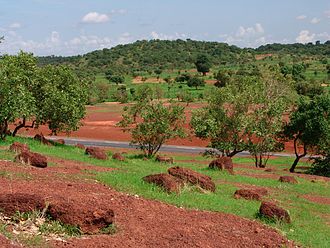Woodland
Woodland
A woodland is a habitat where trees are the dominant plant form. Woodlands are characterized by a more open canopy than forests, allowing more sunlight to penetrate to the ground, which supports a diverse understory of shrubs, herbs, and grasses. Woodlands can be found in various biomes and are an important part of the ecosystem, providing habitat for a wide range of flora and fauna.
Characteristics
Woodlands are defined by their open canopy structure, which distinguishes them from forests. The canopy cover in woodlands typically ranges from 20% to 80%, allowing sufficient light to reach the ground. This light availability supports a rich diversity of plant species in the understory.
Woodlands can vary greatly in their composition and structure depending on the climate, soil type, and geography of the region. They can be found in both temperate and tropical regions, each supporting different species adapted to the local conditions.
Types of Woodlands
Temperate Woodlands
Temperate woodlands are found in regions with moderate climates. They often consist of deciduous trees that shed their leaves in the autumn. Common tree species include oak, maple, and birch.
Tropical and Subtropical Woodlands
These woodlands are found in warmer climates and often feature evergreen species. The miombo woodlands of Africa are a notable example, dominated by Brachystegia and Julbernardia trees.
Mediterranean Woodlands
Mediterranean woodlands occur in regions with hot, dry summers and mild, wet winters. They are characterized by sclerophyllous vegetation, which is adapted to conserve water.
Savanna Woodlands
Savanna woodlands are found in tropical regions with distinct wet and dry seasons. They are characterized by widely spaced trees and a grassy understory.
Montane Woodlands
Montane woodlands occur in mountainous regions and are adapted to cooler temperatures and higher altitudes. They often feature coniferous trees such as pine and fir.
Ecological Importance
Woodlands play a crucial role in the environment. They act as carbon sinks, absorbing carbon dioxide from the atmosphere and helping to mitigate climate change. They also provide habitat for a wide range of species, supporting biodiversity.
Woodlands are important for soil conservation, preventing erosion and maintaining water quality by filtering runoff. They also offer recreational opportunities and have cultural significance for many communities.
Conservation
The conservation of woodlands is vital for maintaining biodiversity and ecosystem services. Threats to woodlands include deforestation, land conversion for agriculture, and climate change. Conservation efforts focus on protecting existing woodlands, restoring degraded areas, and promoting sustainable land management practices.
Related Pages
Transform your life with W8MD's budget GLP-1 injections from $125.
W8MD offers a medical weight loss program to lose weight in Philadelphia. Our physician-supervised medical weight loss provides:
- Most insurances accepted or discounted self-pay rates. We will obtain insurance prior authorizations if needed.
- Generic GLP1 weight loss injections from $125 for the starting dose.
- Also offer prescription weight loss medications including Phentermine, Qsymia, Diethylpropion, Contrave etc.
NYC weight loss doctor appointments
Start your NYC weight loss journey today at our NYC medical weight loss and Philadelphia medical weight loss clinics.
- Call 718-946-5500 to lose weight in NYC or for medical weight loss in Philadelphia 215-676-2334.
- Tags:NYC medical weight loss, Philadelphia lose weight Zepbound NYC, Budget GLP1 weight loss injections, Wegovy Philadelphia, Wegovy NYC, Philadelphia medical weight loss, Brookly weight loss and Wegovy NYC
|
WikiMD's Wellness Encyclopedia |
| Let Food Be Thy Medicine Medicine Thy Food - Hippocrates |
Medical Disclaimer: WikiMD is not a substitute for professional medical advice. The information on WikiMD is provided as an information resource only, may be incorrect, outdated or misleading, and is not to be used or relied on for any diagnostic or treatment purposes. Please consult your health care provider before making any healthcare decisions or for guidance about a specific medical condition. WikiMD expressly disclaims responsibility, and shall have no liability, for any damages, loss, injury, or liability whatsoever suffered as a result of your reliance on the information contained in this site. By visiting this site you agree to the foregoing terms and conditions, which may from time to time be changed or supplemented by WikiMD. If you do not agree to the foregoing terms and conditions, you should not enter or use this site. See full disclaimer.
Credits:Most images are courtesy of Wikimedia commons, and templates, categories Wikipedia, licensed under CC BY SA or similar.
Contributors: Prab R. Tumpati, MD






